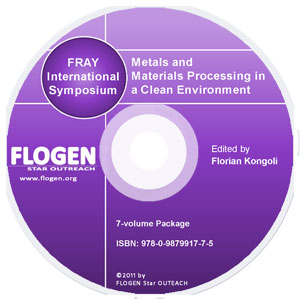
CD shopping page |
2011-Sustainable Industrial Processing Summit
|
| Editors: | Florian K |
| Publisher: | Flogen Star OUTREACH |
| Publication Year: | 2012 |
| Pages: | 630 pages |
| ISBN: | 978-0-9879917-2-0 |
| ISSN: | 2291-1227 (Metals and Materials Processing in a Clean Environment Series) |
Synthesis Of Uranium Trichloride For The Pyrometallurgical Processing Of Used Nuclear Fuel
Brian Westphal1; J.C. Price1; Robert Mariani1; SELECT * FROM contact WHERE email_address REGEXP('brian.westphal@inl.gov|jcprice@inl.gov|robert.mariani@inl.gov')*********************1IDAHO NATIONAL LABORATORY, Idaho Falls, United States;
Type of Paper: Regular
Id Paper: 201
Topic: 6
Abstract:
During the treatment of used metallic fuel with pyrometallurgical processes, sodium, fission products, and actinides are oxidized from their metallic states to chlorides in an electrorefiner. Uranium trichloride is present in the electrorefiner salt, a eutectic mixture of LiCl-KCl, as an oxidant for the metallic species. In the course of fuel processing, uranium trichloride is depleted from the salt and must be replenished to allow continued operations. For used driver fuel, cadmium chloride is added to the Mk-IV electrorefiner for the oxidation of uranium into the salt. The resultant cadmium metal reports to the cadmium pool of the Mk-IV electrorefiner. Processing of the used blanket fuel is also performed in an electrorefiner, the Mk-V, except sans the cadmium pool. Thus, the use of cadmium chloride in the Mk-V electrorefiner is not acceptable and a source of uranium trichloride for blanket processing must be generated. A limited inventory of uranium trichloride was produced for the demonstration operations of the Mk-V electrorefiner. This uranium trichloride was produced in small batches via the reaction of uranium metal and cadmium chloride since no viable commercial source could be determined [1]. Since this source of uranium trichloride has been exhausted, uranium trichloride production has been performed in order to continue operations at the Mk-V electrorefiner. Approximately 44 kg of uranium trichloride is required per metric ton (MT) of blanket fuel processed. Thus, with an inventory near 20 MT of blanket fuel to be processed, approximately 900 kg of uranium trichloride will be consumed during the processing of the blanket fuel. A total of nine experiments have been performed up to the kilogram scale for the production of uranium trichloride. The experiments have been performed in three different furnaces capable of high-temperature distillation operations. The distillation of chloride salts away from metallic species results in a purified uranium trichloride product. All three induction-heated furnaces are capable of temperatures to 1400oC and vacuums to less than 1 Torr. Several metal chlorides have been utilized for the reaction with uranium metal to produce uranium trichloride. The test conditions, observations, and results for these experiments will be presented along with a recommended path forward for the continued production of uranium trichloride.